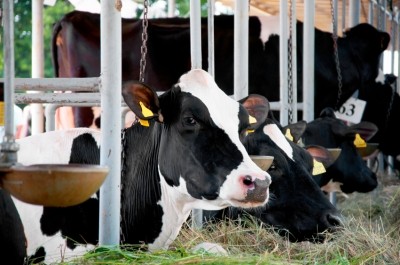Farmers hit out at dairy attacks
environmental criticisms of dairy and other livestock-based farming
it claims are based on outdated exaggerations.
NFU communications director Anthony Gibson said that calls for a boycott of dairy products and meats due to their perceived impacts on gas emissions were based on inaccuracies and would no have a major impact on carbon footprint. The dairy industry is coming under pressure over the environmental impact of it operations across the food chain, from sourcing milk and other raw ingredients at farm level up to energy use during processing. Choice-editing Sustain, which claims to be an alliance for sustainable food production, is just one of the organisations named by the NFU as attempting to discourage dairy and meat consumption due to contributions of livestock farming to greenhouse gas (GHG) emissions. The group has therefore proposed a choice-edit system of menus and food offerings in a bid to cut the carbon footprint of what we eat. However, writing in the NFU journal, Gibson claimed that the calls for reducing the presence of dairy and meats on menus due to livestock sourcing were based on outdated information. "Far from being responsible for '18 per cent' of GHG emissions, as was claimed in a 2006 UN report, called 'Livestock's Long Shadow', farmed livestock in the UK account for only eight per cent of gross emissions," he stated. "Even that figure takes no account of the greenhouse gasses that would be emitted in the course of replacing the contribution that livestock make to diets and fertility." Further to the concerns, the NFU claimed that methane emissions from the cows was continually decreasing in the country, while livestock farms as a whole had a massive role in the carbon cycle. Gibson claimed that Sustain's criticisms were also failing to take into account of a number of environmental benefits created by grazing livestock such as grazed upland habitats, lowland biodiversity and manure, which made organic farming possible. The NFU said it would therefore fight against campaigns by groups like Sustain to 'choice-edit' livestock-sourced products from menus on the basis of what it called "flawed evidence", though conceded that environment was a key issue to address. "We of course recognise the need to reduce the overall environmental impact of livestock production (in line with other responsible industries) but feel that these reductions can be achieved through technological advances in areas such as feeding, breeding and anaerobic digestion," Gibson stated. Industry concerns However, a growing number of players within the dairy industry are reiterating the need for green improvements throughout the dairy production chain. Earlier this year, Christian Robert, director general of the International Dairy Federation, claimed that its experts were increasingly looking for new solutions to reduce the impact of dairy on the ecosystem. "We decided in January that we would move to intensify our efforts towards increasing environmental sustainability for the whole industry," he said. Robert added that the committee was not just looking at improvements in processing, with agricultural issues like fresh water and effluent treatment also proving to be a vital area of the focus. Increasingly, a number of leading dairies such as Arla Foods and New Zealand-based Fonterra have pledged to reduce the environmental impact of their operations from the farm up to the factory. Just last month, Arla announced that it would aim to cut 25 per cent of its current green house gas (GHG) emissions from its entire production and distribution cycle by 2020, in line with revised global targets on industrial carbon dioxide (CO2) output. Environmental fears Despite these pledges by the industry, Sustain, citing recent United Nations figures, said that animal farming led to the creation of more greenhouse gas emissions than all cars, lorries and planes in the world combined. The group claimed that this was related to a number of factors including the large amounts of animal feed required for production of a small amount of meat or milk. According to Sustain, this feed demand requires nitrogen fertilizers to be used in their production, which leads to emissions of the nitrous oxide greenhouse gas. The group claimed that the growing amount of land needed for dairy or crop farming was also in some cases destroying forest area vital for absorbing carbon dioxide, further endangering the environmental balance. Concerns over converting forest areas into dairy farm pasture have also been expressed by environmental groups such as Greenpeace, which last week attempted to reforest part of a New Zealand government-owned dairy farm. The organisation said that the action was an attempt to raise awareness of its concerns over intensive dairy farming in the regions of the Central North Island and Canterbury. "Large-scale deforestation and intensification of dairy farming is being pursued with the bottom line, not New Zealand's larger social, economic and environmental welfare in mind," Greenpeace stated.





